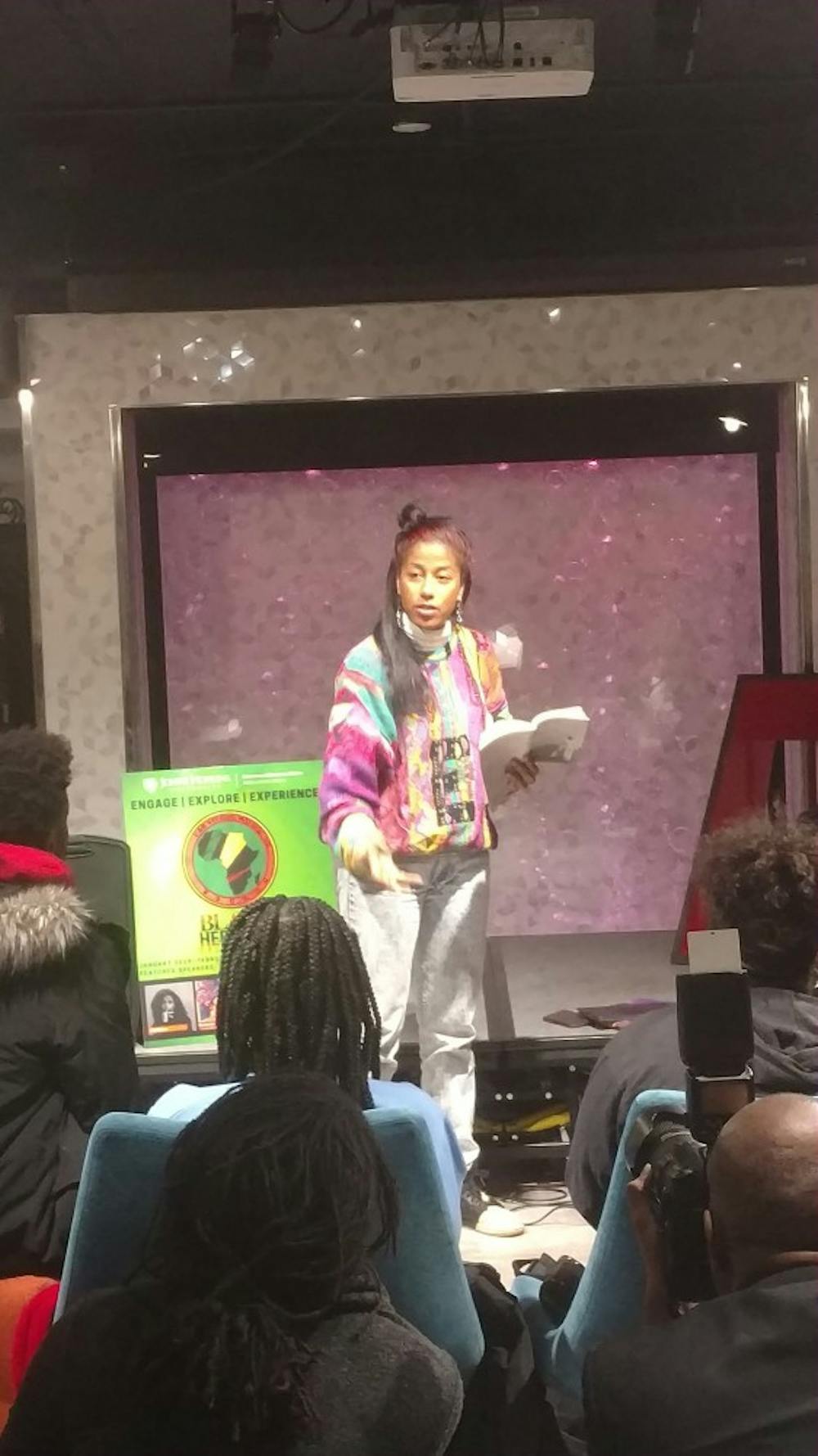The highlight of the opening ceremony for the Black Heritage Celebration on Friday, Feb. 1 was undoubtedly the poetry, though the conversation was lively and the hot chocolate provided some much needed warmth as well. To kickoff its year-round initiative to celebrate African-American history and culture, the Office of Multicultural Affairs invited a group of incredibly talented poets to read their work and reflect on the experiences of people of color in the United States. Through their unique voices and powerful poems, the three women who read crafted an experience that was equal parts thought-provoking and heart-breaking, and their performances formed a strong cornerstone for the rest of the event series.
Mecca Verdell, a Baltimore resident and one of the city’s former Youth Poet Ambassadors, was the first of the three to read. Of the group, her readings were the most clearly connected to the modern age, using technology and slang to examine the ways that society discriminates against people of color.
Her opening poem, for instance, used autocorrect as a metaphor to examine the way that society polices people of color, both in terms of language and actual incarceration. It was a hilarious piece for a heavy topic, made all the better by Verdell’s passionate recitation, but there was also a strong undercurrent of anger that really drove the piece forward to its understated yet poignant conclusion.
Physical appearance and the weight of beauty standards were other common themes throughout Verdell’s readings. One poem focused on hair and the way that society’s opinion of beauty is so often centered around white people. “DSL’s,” my favorite of her pieces, discussed the sexualization of women of color and culminated in Verdell furiously spitting out one tongue-twisting acronym after another.
Verdell was followed by Aja Monet, a Caribbean-American poet and activist who was recently nominated for the NAACP’s Image Award for Outstanding Literary Work-Poetry. In her poems Monet frequently used long, drawn-out phrases that spilled out over one another and always seemed to be on the verge of releasing some pent up feeling out onto the audience.
Monet’s opening piece was “My Mother Was A Freedom Fighter,” which she read at the first Women’s March in 2018. Alongside the piece, Monet described the inspiration behind the poem. “I recognized that it wasn’t just my mother but every mother that has tried to sustain themselves in this system and raise kids. There’s no one more unprotected and unloved in America than the black mother,” she said. The reading was somber yet ultimately triumphant, and every line demonstrated the author’s fantastic attention to sound and language.
Later, Monet spoke about her work providing programming for black youth and inmates in correctional facilities, and the effects of gun violence on the black community. Afterward she read “The Kids Who Live,” which combined a beautifully hopeful vision of the future with a call to action to ensure that we create that ideal future.
Finally, Dominique Christina, a writer and activist, took the stage and delivered some of the most passionate readings that I’ve ever seen. Every single one of her pieces was almost overwhelming in their intensity, and Christina’s recitation could be considered a theatrical performance. She embodied every line with such sincere and pure emotion that it was impossible to be unaffected by her words.
Christina’s poems told from the perspective of Anarcha, an enslaved woman who was owned by a doctor and used as a guinea pig in his medical research, were perhaps the most affecting of the entire evening. The poems trace Anarcha’s life as a slave, and the transition from her early attempts at living a hopeful life to the agony and confusion of childbirth is completely devastating. Christina’s reading perfectly hit every emotional beat, and the power in her words was truly incredible.
She followed the Anarcha poems with “Birmingham Sunday,” a poem about the bombing of a black Baptist church in 1963 in which four girls were killed. Christina’s reading was reverent yet haunting, juxtaposing the violence of the attack with the faith and community that surrounded the building that was destroyed. During the piece she sang a few lines from a hymn, and the grief in the air during those moments of song was overwhelming.
Fittingly enough the final poem of the evening was about poetry and its role as critique of society. Though it started off fairly subdued, the piece quickly exploded with rage and frustration and, most importantly, a desire for change. “If I could write this shit in fire, I would write this shit in fire,” was one of the most powerfully delivered lines of the entire evening.
Unsurprisingly, the opening event was a fantastic way to kick off the Black Heritage Celebration. Each of the three poets gave incredible and memorable readings, and their talents as both writers and performers were on full display. If the rest of the event series is able to maintain the strength of its opening act, then it would be well worth your time to check out what comes next.





